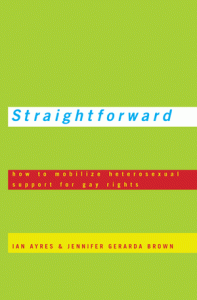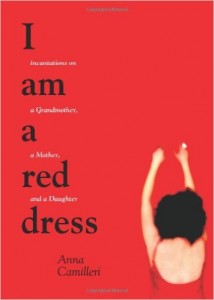 Straightforward: How to Mobilize Heterosexual Support for Gay Rights
Straightforward: How to Mobilize Heterosexual Support for Gay Rights
by Ian Ayres and Jennifer Gerarda Brown
Princeton University Press. 304 pages, $24.95
Every gay man or lesbian in America has at least two heterosexual allies willing to actively support their struggle for equality, assert Ian Ayres and Jennifer Brown, husband-and-wife law professors and activists. This translates into some twenty million straight men and women who need to be given “pragmatic advice” on how they can support their gay friends. The book argues that heterosexuals who wish to enter the gay rights fray must first come to terms with “heterosexual privilege,” a concept defined as “the range of perks and incentives with which heterosexually identified persons are rewarded for conforming to the dominant sexuality.” They must be willing to renounce this privileged status by engaging in behaviors that put them on an equal footing with gay people. The authors propose a variety of strategies that straight people can pursue to this end, such as vacationing only in places that protect gay rights and permit same-sex marriage. (Here they advise a visit to a website they’ve started where you can take the “vacation pledge for equal marriage rights.”) Another proposal is the “fair employment mark,” which would allow consumers to purchase products bearing a mark that signals gay-friendly employment policies. Accessible and consistently engaging, the book is certain to stimulate both casual and classroom discussion, particularly the authors’ assertion that heterosexuals should consider concealing their sexual orientation in their fight for GLBT equality. (But does a straight person with a gay pride flag on their front door really have an impact on the gay rights struggle?) Straightforward ultimately delivers on its promise to provide a practical guide to action by offering innovative economic and legal tactics for influencing public and corporate policy.
Tony Peregrin
 Provincetown: From Pilgrim Landing to Gay Resort
Provincetown: From Pilgrim Landing to Gay Resort
Karen Christel Krahulik
NYU Press. 256 pages, $29.95
Krahulik has constructed a responsible piece of social research that accurately chronicles Provincetown’s evolution from First Landing Place of the Pilgrims, to rag-tag settlement, to the reign of moralistic preachers, to prosperous whaling town, to Portuguese fishing village, to nascent art community, to Colonial Landmark where white tourists celebrating their ethnic heritage could improve themselves by witnessing dark-skinned people labor, to creative crucible of American theater and Abstract Expressionist painting, to male gay Mecca via Greenwich Village and a preponderance of sailors during WWII, to the beat/hippie invasion, to lesbian rule during the 80’s, and on to the pricy gay retirement community it’s becoming today. All the facts are there, but the book has the aura of a doctoral thesis adapted for publication. The weight of a research project lifts briefly as Krahulik enthusiastically describes the rise of lesbian entrepreneurship in the 1980’s and the gradual—though still tentative—takeover of P’town politics by gays and lesbians. Even these passages are marred by the politically correct language of academic departments whose days have passed. This book performs a service by judiciously compiling the facts of Provincetown’s history. But one longs for the vistas, the scent of the ocean, the stories, weather, characters, adventures, outlawry, and excess that has made Provincetown one of the indispensable incubators of American culture.
Wendy Fenwick
 I Am a Red Dress
I Am a Red Dress
by Anna Camilleri
Arsenal Pulp Press. 183 pages, $16.95
Anna Camilleri is a second generation Italian-Canadian performance artist and writer. While her memoir begins slowly, with loving and sometimes cloyingly sweet memories of her beloved grandmother, the Italian-speaking Nonna, it quickly becomes a wrenching tale of sexual abuse, as both the writer and her mother endure horrifying, relentless assaults perpetuated by the grandfather, with Nonna’s full knowledge. The red dress of the title is what the author’s mother, who was aware that her daughter was being raped, promised she would wear at the funeral of the perpetrator. It also comes to represent Camilleri’s courage, compassion, and almost incomprehensible ability to forgive. It was her bravery, a police department’s willingness to believe her, and the Canadian judicial system that sent the perpetrator to jail for three years. The author, who attended an all-girls’ school in Toronto, became a feminist at an early age, and coming out as a lesbian does not seem to have been much of an issue for her. Several of the more light-hearted chapters describe some of her affairs, but the author’s sexuality plays a relatively minor role in this book. Much of its episodic nature derives from chapters having been performed onstage or published in different versions. Anna Camilleri (about whom more information is available at www.annacamilleri.com), joins the ranks of Dorothy Allison and Michelle Tea with her solid writing abilities and fearless lesbian persona.
Martha E. Stone






